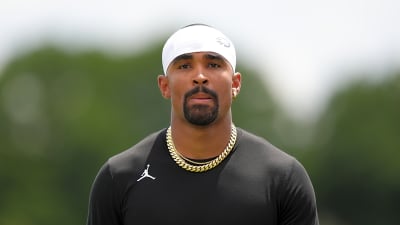- Home
- Quizzes
- My Quiz Activity
- Newsletters
- MY FAVORITES
- Add Sports/Teams
- SPORTS
-
NFL
- NFL Home
- Arizona Cardinals
- Atlanta Falcons
- Baltimore Ravens
- Buffalo Bills
- Carolina Panthers
- Chicago Bears
- Cincinnati Bengals
- Cleveland Browns
- Dallas Cowboys
- Denver Broncos
- Detroit Lions
- Green Bay Packers
- Houston Texans
- Indianapolis Colts
- Jacksonville Jaguars
- Kansas City Chiefs
- Las Vegas Raiders
- Los Angeles Chargers
- Los Angeles Rams
- Miami Dolphins
- Minnesota Vikings
- New England Patriots
- New Orleans Saints
- New York Jets
- New York Giants
- Philadelphia Eagles
- Pittsburgh Steelers
- San Francisco 49ers
- Seattle Seahawks
- Tampa Bay Buccaneers
- Tennessee Titans
- Washington Commanders
-
MLB
- MLB Home
- Athletics
- Arizona Diamondbacks
- Atlanta Braves
- Baltimore Orioles
- Boston Red Sox
- Chicago White Sox
- Chicago Cubs
- Cincinnati Reds
- Cleveland Guardians
- Colorado Rockies
- Detroit Tigers
- Houston Astros
- Kansas City Royals
- Los Angeles Angels
- Los Angeles Dodgers
- Miami Marlins
- Milwaukee Brewers
- Minnesota Twins
- New York Yankees
- New York Mets
- Philadelphia Phillies
- Pittsburgh Pirates
- San Diego Padres
- San Francisco Giants
- Seattle Mariners
- St. Louis Cardinals
- Tampa Bay Rays
- Texas Rangers
- Toronto Blue Jays
- Washington Nationals
-
NBA
- NBA Home
- Atlanta Hawks
- Boston Celtics
- Brooklyn Nets
- Charlotte Hornets
- Chicago Bulls
- Cleveland Cavaliers
- Dallas Mavericks
- Denver Nuggets
- Detroit Pistons
- Golden State Warriors
- Houston Rockets
- Indiana Pacers
- Los Angeles Clippers
- Los Angeles Lakers
- Memphis Grizzlies
- Miami Heat
- Milwaukee Bucks
- Minnesota Timberwolves
- New Orleans Pelicans
- New York Knicks
- Oklahoma City Thunder
- Orlando Magic
- Philadelphia 76ers
- Phoenix Suns
- Portland Trail Blazers
- Sacramento Kings
- San Antonio Spurs
- Toronto Raptors
- Utah Jazz
- Washington Wizards
-
NHL
- NHL Home
- Anaheim Ducks
- Boston Bruins
- Buffalo Sabres
- Calgary Flames
- Carolina Hurricanes
- Chicago Blackhawks
- Colorado Avalanche
- Columbus Blue Jackets
- Dallas Stars
- Detroit Red Wings
- Edmonton Oilers
- Florida Panthers
- Los Angeles Kings
- Minnesota Wild
- Montreal Canadiens
- Nashville Predators
- New Jersey Devils
- New York Islanders
- New York Rangers
- Ottawa Senators
- Philadelphia Flyers
- Pittsburgh Penguins
- San Jose Sharks
- Seattle Kraken
- St. Louis Blues
- Tampa Bay Lightning
- Toronto Maple Leafs
- Utah Mammoth
- Vancouver Canucks
- Vegas Golden Knights
- Washington Capitals
- Winnipeg Jets
- NCAAF
- NCAAM
- Olympics
- Boxing
- Entertainment
- Lifestyle
- Golf
- MMA
- Soccer
- Tennis
- Wrestling
- Sports Betting
- More Sports
- RESOURCES
- My Account
- YB on Facebook
- YB on Twitter
- YB on Flipboard
- Contact Us
- Privacy Policy
- Terms of Service
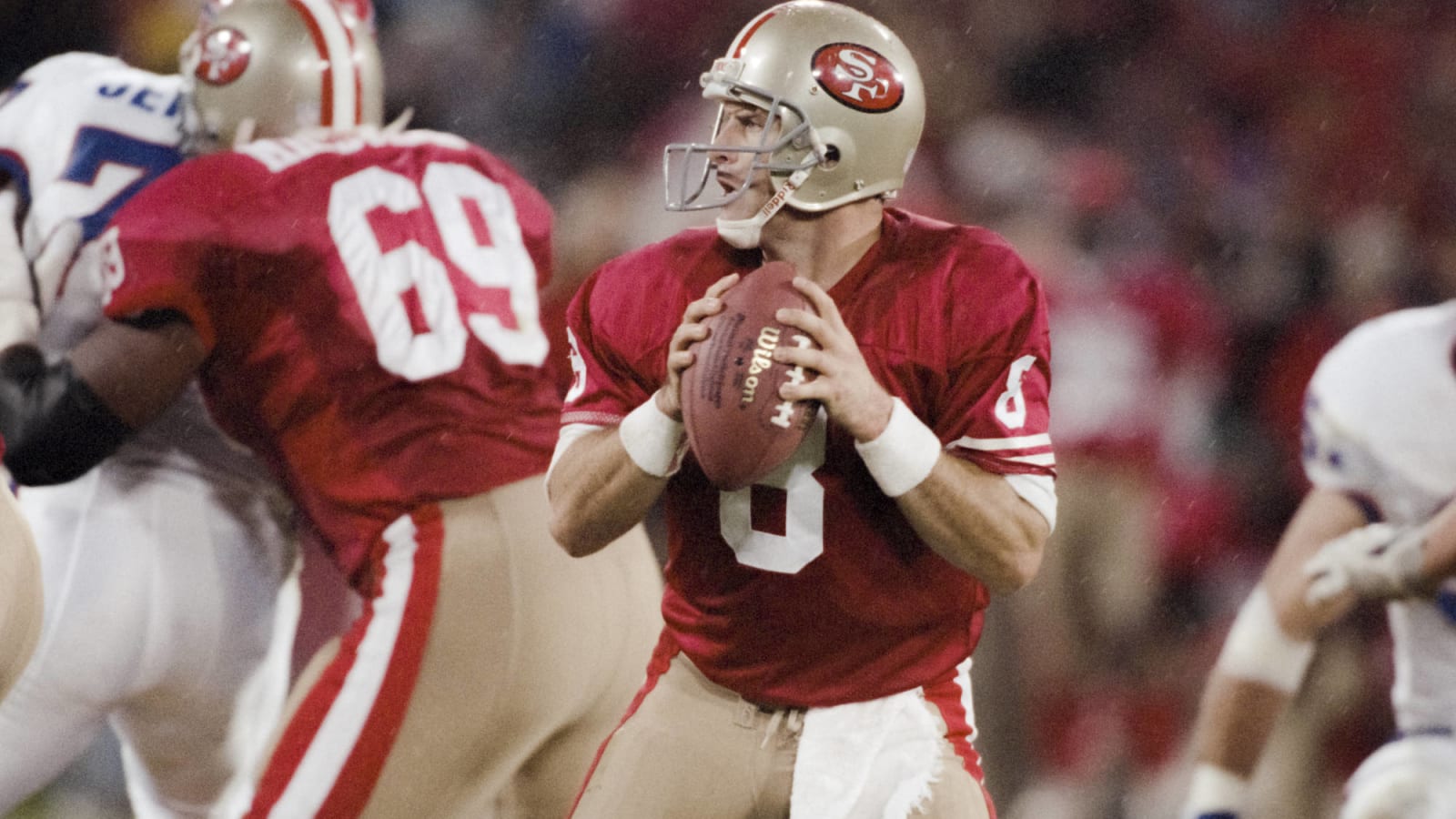
Implemented at full-fledged free agency's 1993 outset, the franchise tag can keep one player per team off the open market. Given the tag's restrictive nature, this produces annual drama and sets up high-stakes decisions each summer. At the 25-year mark and with more decisions due by July 16, here are the top deadline moments in this process' history.
1993: Steve Young

The first year teams had this option, the 49ers used it to keep the reigning MVP off the market. Young joined the other nine players franchise-tagged that year in a legal fight, one led by Washington linebacker Wilber Marshall. But a judge ruled to allow the NFL's controversial clause in its new CBA to go through. Young agreed to a then-record five-year, $26.75 million contract that July to stay in San Francisco. Joe Montana's successor proceeded to win another MVP, then Super Bowl XXIX and start for the 49ers for the rest of the 1990s.
1993: Paul Gruber
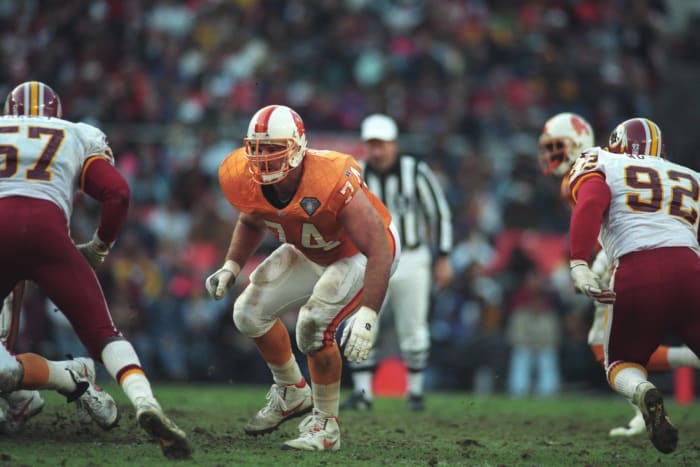
The last of the inaugural tagged contingent to suit up that season, Tampa Bay's cornerstone left tackle sat out six games amid a contract stalemate. But the Buccaneers found a solution by agreeing to ship Gruber to the Raiders. However, the deal fell apart just before the October trade deadline. The Bucs then inked Gruber to a team-record four-year, $8.6 million contract (under past CBAs, teams could negotiate with franchise players past mid-July). The Bucs' 1988 first-rounder returned to work and remained the team's blind-side protector until the turn of the century.
1997-98: Sean Gilbert
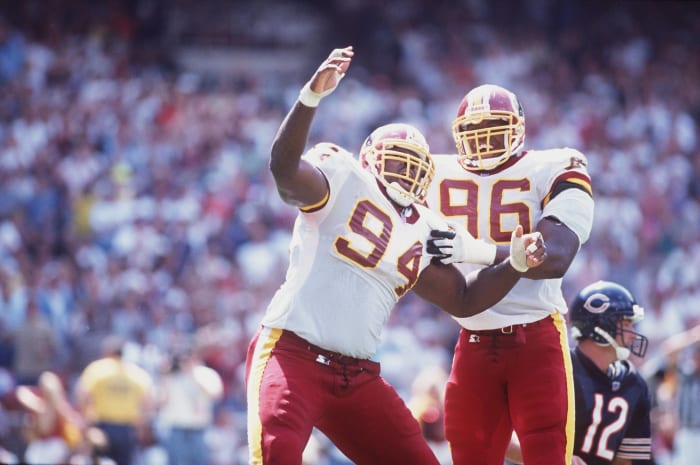
Gilbert took Wilber Marshall's Washington tag angst to another level by sitting out an entire season. The Rams traded the defensive tackle to Washington in 1996 for a top-10 pick, and he played in 16 Washington games that season. Washington then gave Gilbert a $2.8 million tag in 1997, and he responded by skipping the season and taking the team to court. However, Washington won that case and tagged Gilbert again in '98. The Panthers, though, signed the defender to a seven-year, $46.5M offer sheet and surrendered two first-round picks to land him. Gilbert played five seasons with Carolina.
1998: Dan Williams

Williams' tactics may have the originality edge on Gilbert's. The one-time Broncos first-rounder signed a low-level Chiefs deal in 1997 and led a team that employed Derrick Thomas in sacks. Upon being designated as Kansas City's franchise player the next year, the defensive lineman refused to play for the Chiefs again. He moved to Atlanta, at one point didn't give the Chiefs his phone number and sat out the entire season. No franchise-tagged player has skipped a season since. The team caved in 1999 by re-signing Williams to a five-year, $28 million deal. Williams played two more seasons in K.C. before a 2001 release.
1999: Carl Pickens

The flagship wide receiver on many bad Bengals teams, Carl Pickens exited Cincinnati awkwardly after eight seasons. Slapped with the tag in 1999, Pickens held out until days before the Bengals' opener before the team relented and signed him for five years and $23M. But Pickens soon wanted no part of Bengals employment, criticizing Cincinnati's decision to retain head coach Bruce Coslet, then demanding a trade to a better team. The Bengals begrudgingly cut bait the following summer, leading the Tennessee alum to sign with the Titans. Injuries, though, limited Pickens to just one more season.
2000: Simeon Rice

The Cardinals lost two Hall of Fame-caliber defenders in one offseason, and both ended up on soon-to-be NFC champions. The Cardinals franchised Rice in 2000 and couldn't extend him. The defensive end held out until Week 2 and bolted the desert as a free agent in 2001. Soon after, Arizona traded Hall of Fame cornerback Aeneas Williams to the Rams. Rice's sack efficiency ranks among the NFL's best, and he played a key role on the Buccaneers' dominant Super Bowl champion defense in 2002. He notched 69.5 sacks in six Bucs seasons as the Cards floundered.
2002: Tony Gonzalez
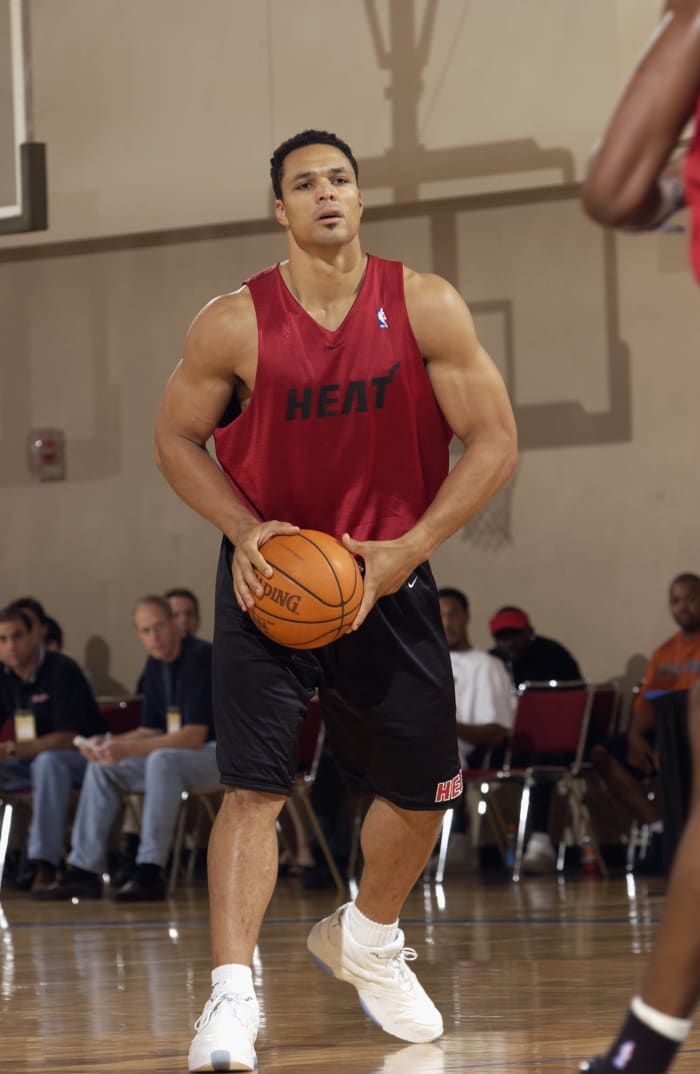
One of the greatest tight ends in NFL history found a unique way to spend a summer contract impasse. Given the franchise tag after his rookie deal expired, Gonzalez suited up for the Miami Heat's summer league team. The former Cal hoops cog suffered an injury during that short stay, causing then-Chiefs president Carl Peterson to issue an ultimatum: ditch the hoops hobby or else. The Chiefs rescinded a long-term offer to Gonzalez in July, but the parties soon made up in the form of a then-tight end record $31 million extension.
2002-04: Walter Jones
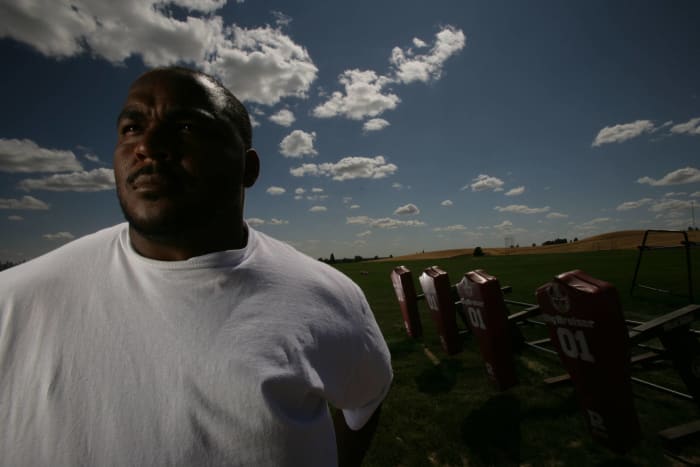
The clubhouse leader for seasons on the franchise tag, Jones went through an amazing four years' worth of negotiations with the Seahawks. Seattle's left tackle played three seasons on the tag, separating him from the three-tag crew's other members. Betting on himself, Jones collected $20 million-plus those years without long-term stability. He skipped each training camp (and two games in 2002) yet made those seasons' Pro Bowls. In February 2005, Jones signed for seven years and $52.5M. He played four more seasons, two as a first-team All-Pro.
2003-05: Orlando Pace
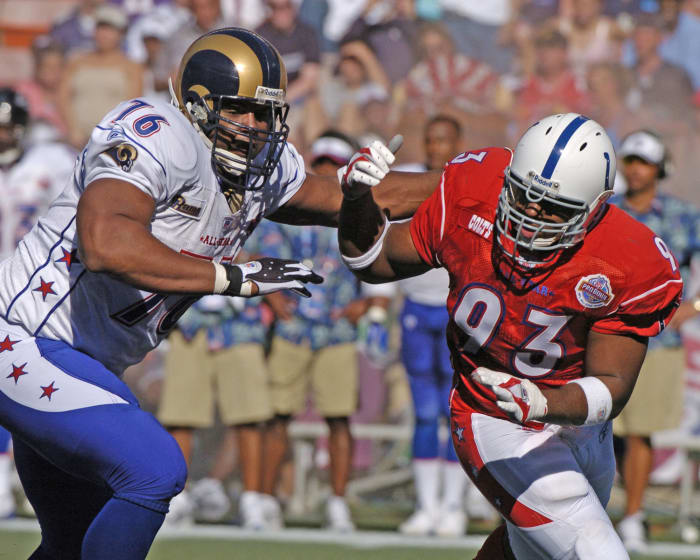
The Rams' mid-2000s tag decisions added to a strange chapter in NFC West blocking history. Pace received three tags and played two seasons under that arrangement. Unlike Jones, though, Pace's best years were behind him by the time the Rams rewarded him with a seven-year, $52.8M deal a month after Jones' market-setting pact. The All-Pro left tackle visited the Texans in 2005 and agreed to terms, but the teams did not agree on a trade. Pace played four more seasons in St. Louis before retiring after a 2009 campaign spent in Chicago.
2003-05: Donovin Darius
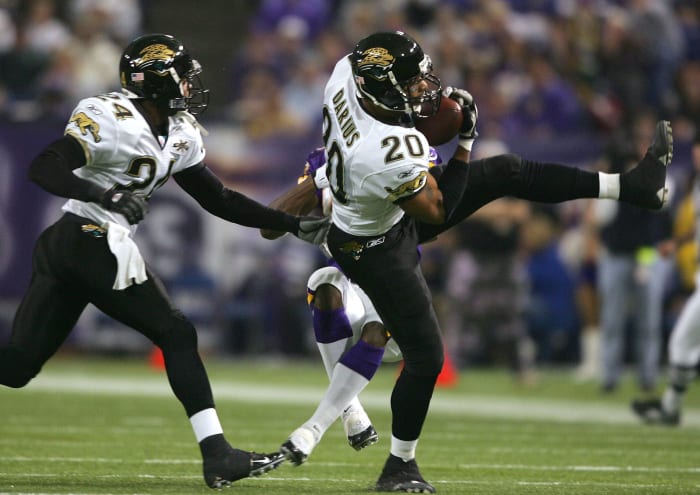
While Jones and Pace are Hall of Famers, Darius joins them in the three-tag club despite never being a Pro Bowler. The former Jaguar was an upper-echelon safety during his prime, but Jacksonville refused to commit to him. The Jags played it year-to-year with Darius, leaving the former first-round pick feeling disrespected. Darius didn't receive a long-term deal until he was 30 in 2005, and the Jags bailed on the three-year pact after the '06 season.
2004-05: Charles Woodson

The beginning and end of Woodson's career produced a cavalcade of accolades. The middle? Largely injuries, scant interception opportunities, and a forced fumble that didn't count. Oakland franchised Woodson in back-to-back years but let him walk in 2006 rather than pay him $12.6 million on a third tag. The Heisman winner reignited his career on a seven-year Packers pact, playing out the contract while earning two All-Pro honors, 2009 Defensive Player of the Year acclaim and winning a ring a year later. While the eventual Hall of Famer returned to the Bay Area in 2013, the Raiders missed his most memorable stretch.
2005: Adam Vinatieri

Teams often tag kickers since the costs aren't prohibitive. Jason Elam, Justin Tucker, Stephen Gostkowski and Phil Dawson (twice) have been among those tagged. But Adam Vinatieri is the only Hall of Fame lock here, and he's been tagged twice as well — in 2002 and '05. The latter Patriots decision set up seminal changes. They let Vinatieri walk, and his replacement (Gostkowski) is still going. The Colts signed the game's premier clutch kicker to replace the embattled Mike Vanderjagt, and the 45-year-old Vinatieri remains in that role 12 years later.
2005: Shaun Alexander
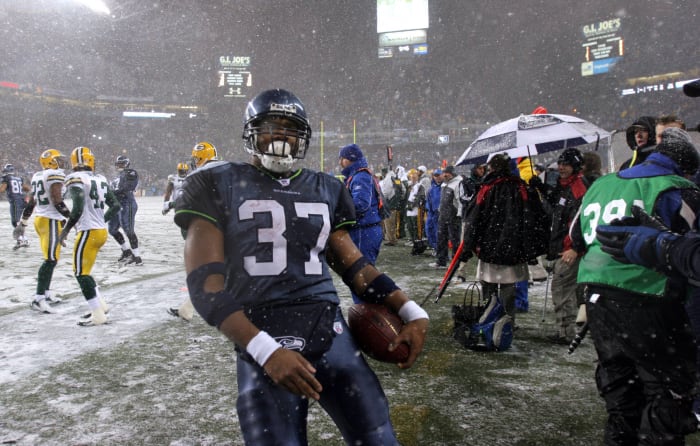
Their cap free of Walter Jones' tag-to-tag-to-tag arrangement, the Seahawks franchised their Pro Bowl running back while signing Jones and Matt Hasselbeck to long-term deals that winter. Alexander played 2005 on a $6.23M tag and erupted for a then-record 28 touchdowns. The Seahawks rewarded the NFL MVP with an eight-year, $62M deal in 2006. Alexander's production declined immediately after, and he played just two seasons on that contract.
2005: Corey Simon
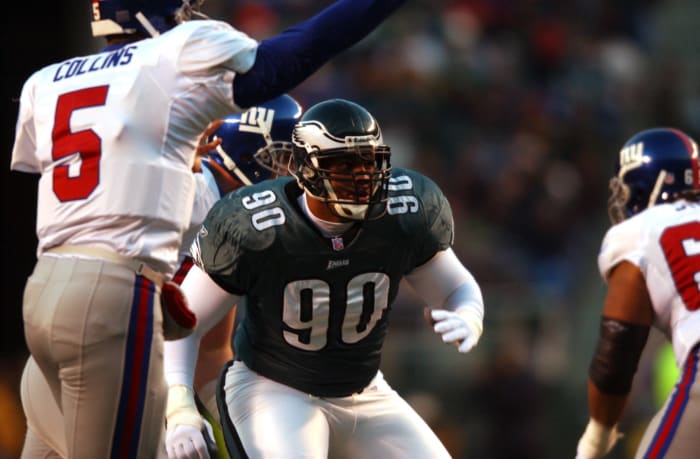
A key Eagles defender during their early-2000s run to four straight NFC title games, Simon waged multiple holdouts prior to a pivotal chapter in franchise tag history. During Simon's 2005 training camp holdout, the Eagles rescinded his franchise tender to make him a free agent. The Colts soon swooped in and added the defensive tackle on a five-year, $30 million deal. However, the team placed Simon on the PUP list for all of the '06 season, withheld salary and attempted to recoup bonus money, prompting multiple grievances. The eventual Super Bowl champions didn't invite Simon to the White House and released him in 2007.
2005: Drew Brees
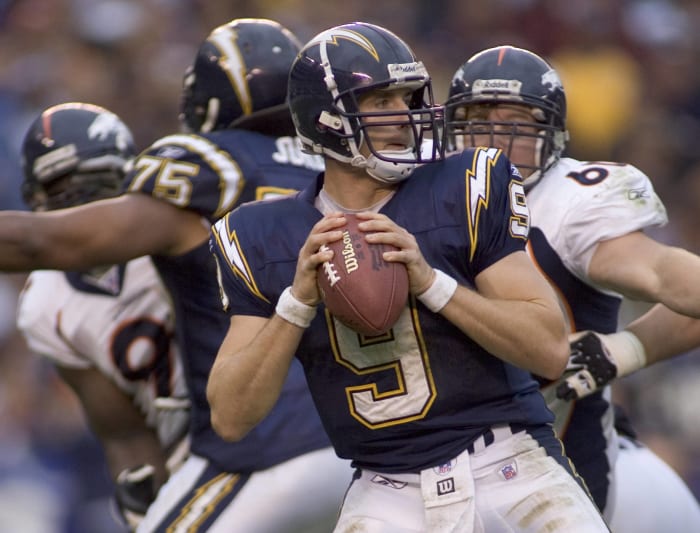
San Diego's 2004 Philip Rivers addition put Brees on notice, but the incumbent provided a glimpse of the future by holding off Rivers for two years. Still, Rivers' presence halted a Brees extension in 2005. In Week 17, Brees suffered a shoulder injury that shelved him for months. The Chargers debated using the transition tag on Brees but handed the reins to their first-round backup, creating a Saints-Dolphins bidding war (the Nick Saban-led Dolphins dropped out to trade for Daunte Culpepper). The Saints landed Brees for six years and $60 million, though he may still be with the Bolts were it not for one John Lynch sack 13 years ago.
2005-06: John Abraham
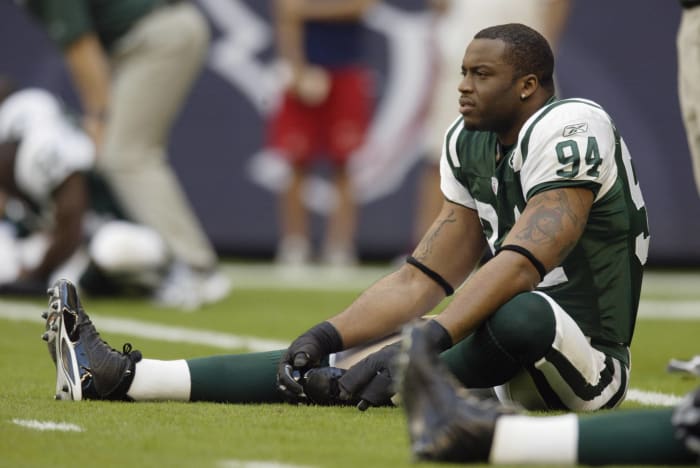
Despite playing just six seasons with the Jets, Abraham is their No. 3 all-time sack artist. But he and the Jets tried for many months to reach an extension agreement. This resulted in Abraham playing 2005 on the tag and being tagged again in the offseason. The Jets shipped the defensive end to the Falcons in a pivotal three-team deal before the 2006 draft. Abraham got his money on two Falcons contracts during a seven-year stay, the Jets used the Broncos' '06 first-rounder to draft stalwart center Nick Mangold, and the Broncos traded Atlanta's choice to move up and select Jay Cutler.
2007: Lance Briggs

Much like they would do with Matt Forte five years later, the Bears played hardball with Briggs. Livid at being tagged, the linebacker vowed he would never play for the team again or would hold out until Week 10 if he had to. Briggs did report to camp and played 2007 on a one-year, $7.2 million tender. Following a self-imposed media boycott, the perennial Pro Bowler changed his tune on a Chicago future and ended up re-signing for six years and $36M after briefly testing free agency in 2008. He played seven more seasons with the Bears.
2008: Albert Haynesworth
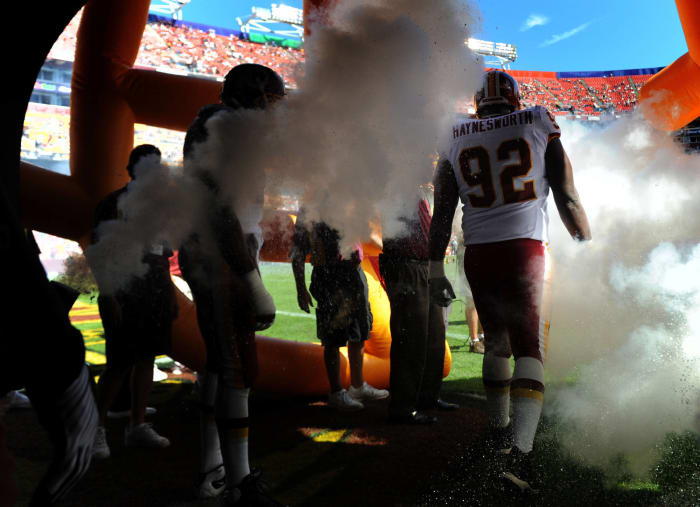
Sometimes it's the contracts teams don't authorize. The Titans tagged Haynesworth and received a second straight first-team All-Pro season. They did not submit Haynesworth an offer prior to the defensive tackle hitting the market in 2009, which is telling given what happened next. Washington's seven-year, $100M bid won, only the contract turned into one of the biggest disasters in free agency history. The defensive tackle played two years in Washington as a shell of his dominant Titans version and was soon out of football.
2009: Julius Peppers

A native North Carolinian, Peppers looks to finish out his career with the Panthers. But Carolina missed some of the pass rusher's lengthy prime. Stalled negotiations — over what Peppers said was a mere $6 million gap — led the Panthers to franchise their star defensive end in 2009. With a second tag costing $20M in 2010, Carolina let Peppers leave. The Bears got him for $92M ($42M guaranteed) before shedding the deal in 2014. The NFL's No. 4 all-time sacker spent seven years in the NFC North before returning home in 2017 at age 37.
2011: Vincent Jackson
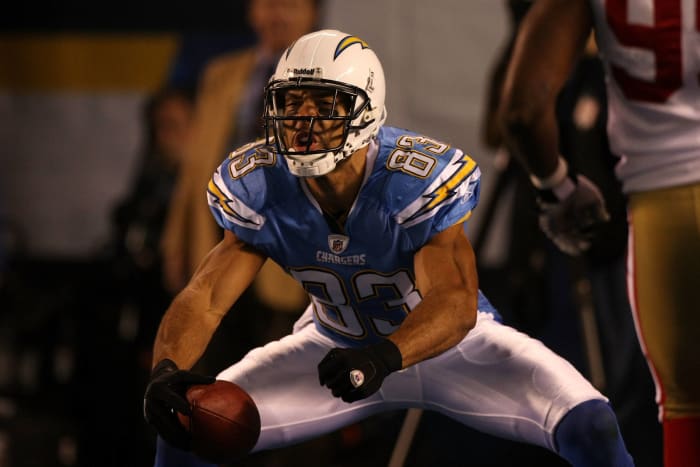
A unique labor wrinkle affected Jackson's NFL trajectory. The 2010 season was uncapped, denying Jackson and select others free agent status. The Chargers wide receiver responded by holding out until midseason, showing up only to get credit for an accrued season toward free agency. However, the Bolts further delayed his free agent bid in 2011 by franchising him. Like in 2010, the sides failed to agree on terms. After one of his six 1,000-yard seasons, Jackson bolted San Diego for a five-year, $55M Buccaneers contract in 2012.
2011: Peyton Manning

Though Manning was in between his second and third neck surgeries in a four-operation year, the Colts signed him for five years and $90 million. (They'd previously put off an extension until after the 2011 lockout.) They had tagged Manning for a second time, the first coming in 2004 prior to a massive extension, but built in unique insurance due to the quarterback's health crisis. An escape hatch existed in the form of a 2012 option bonus. Since Manning missed all of 2011, allowing Indianapolis to land the No. 1 pick, the Colts cut their iconic QB. Manning signed a five-year, $96M deal with the Broncos two weeks later.
2013: Henry Melton
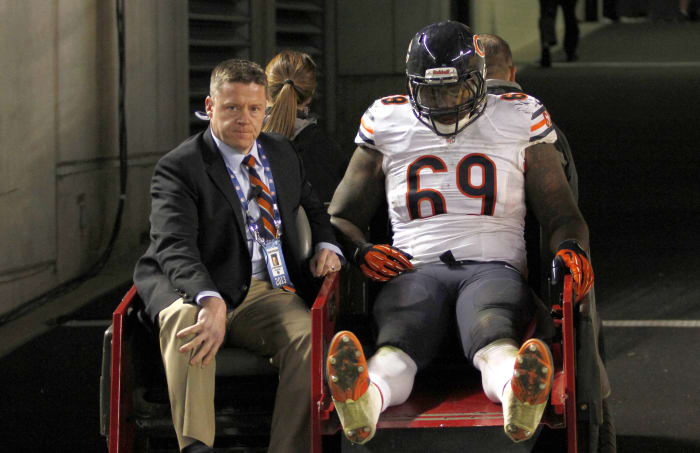
One of casualties of the tag era, Melton saw 2013 change his career. The Bears placed an $8.45 million tag on the defensive tackle, keeping a 2012 Pro Bowler who'd never previously seen a seven-figure salary off the market. Three games into the '13 season, Melton tore an ACL. The former fourth-round pick could not re-establish his value post-injury and settled for one-year, lower-level contracts from the Cowboys and Bucs. His career is likely over.
2014: Greg Hardy

A few months before the career-defining alleged domestic violence incident, Hardy received a Panthers franchise tag. The same team that rescinded Josh Norman's tag in 2016 could not do so two years earlier since Hardy had signed his $13.4 million tender. The tag becoming guaranteed upon signing locked the Panthers into that payment, and they received just one game from Hardy prior to the one-time standout defensive end landing on the commissioner's exempt list. The Cowboys signed Hardy to a one-year deal in 2015.
2014: Jimmy Graham
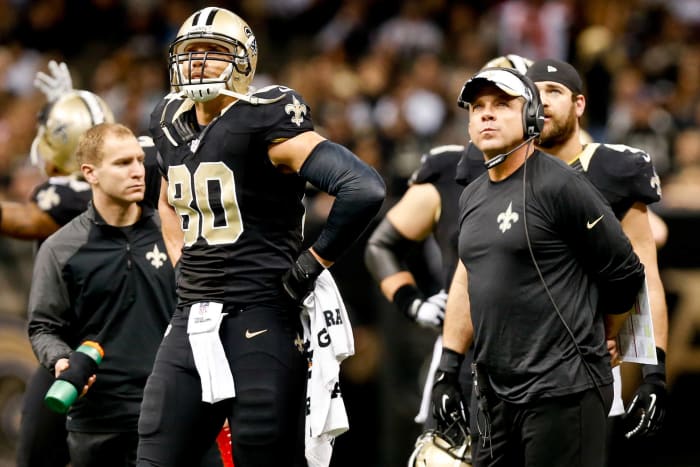
A technicality hurt Graham's bargaining power during his final year with the Saints. Split out wide often in New Orleans, the Saints' red zone machine lobbied to be classified as a wide receiver (and thus receive a $12.3M tag value) rather than a tight end ($7.1M). An arbitrator deemed Graham a tight end, with part of the NFL's super-official argument citing the words "tight end" in Graham's Twitter bio. The Saints, though, rewarded Graham with a four-year, $40M deal at the tag deadline. They then dealt him to the Seahawks the following spring.
2015: Dez Bryant/Demaryius Thomas
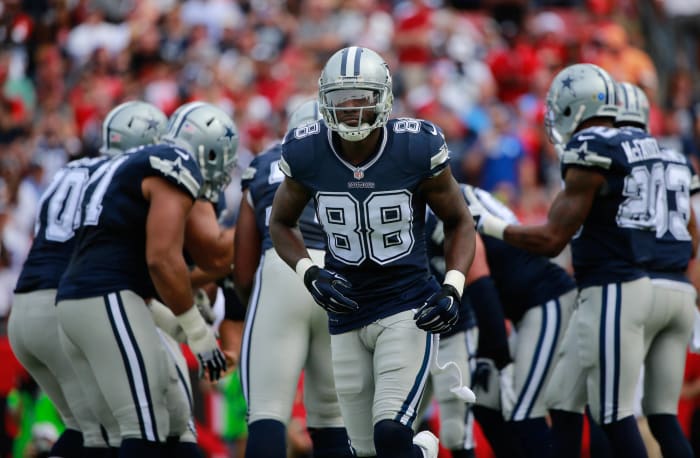
Minutes before 2015's July deadline, the NFL's non-Megatron No. 1 receiver market took shape. Bryant signed a five-year, $70 million Cowboys extension, and minutes later the Broncos inked Thomas for the exact same price. This led to similar re-ups for A.J. Green, Julio Jones and others. John Elway's deal worked out a bit better than Jerry Jones'. Thomas remains Denver's No. 1 target four seasons later, but injuries and production slippage caused Dallas to bail on Bryant in April. He remains a free agent.
2016: Von Miller
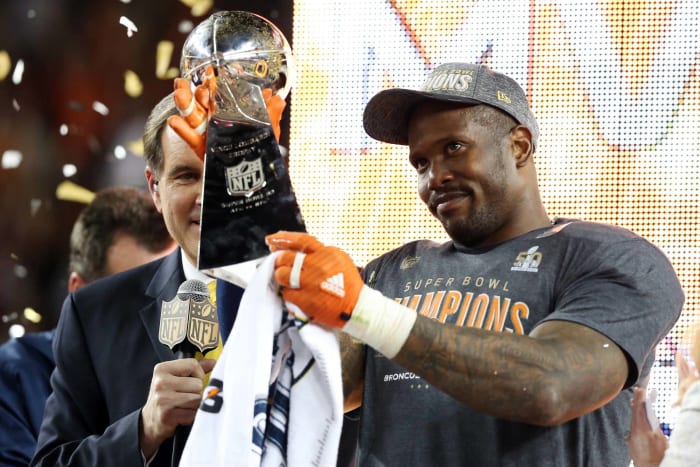
The franchise tag game met the social media era head-on when Miller showed his displeasure with the process by cropping John Elway out of a picture at the White House. Prior to becoming the Super Bowl 50 MVP, Miller had to rebuild his stock following a suspension and ACL tear in 2013. He was still without an extension by his sixth offseason. However, Elway improved to 4-for-4 on franchise player accords by authorizing a record six-year, $114.6 million deal at the deadline. On this contract, the likely Hall of Fame linebacker became Denver's centerpiece player following Peyton Manning's retirement.
2016: Muhammad Wilkerson
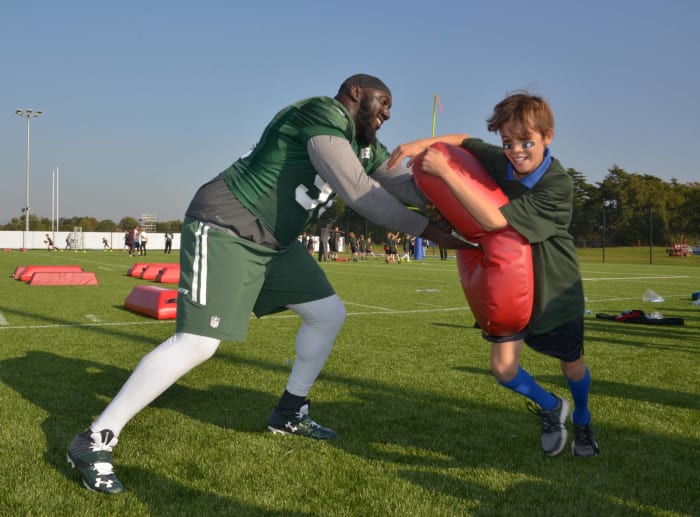
The Jets have struggled with big investments during the Mike Maccagnan era. A year after the disastrous Darrelle Revis deal, they tagged Wilkerson — a perpetual trade-block occupant — and shocked the NFL by signing the sixth-year player for five years and $86M minutes before the deadline. Once an All-Pro-caliber player, Wilkerson did not produce on the level he once did and induced the Jets to release him after two years. Like with Revis, the Jets are eating a sizable dead-money chunk ($9M) for cutting bait so early. `
2016-17: Trumaine Johnson
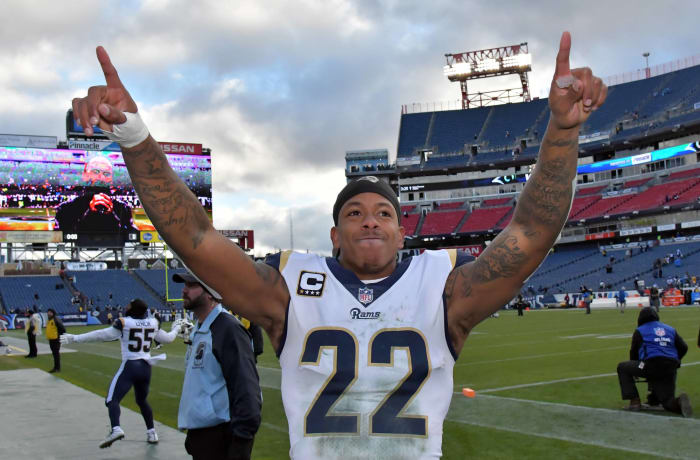
A quality cornerback but not a top-tier one, Johnson played the tag game well. The Rams lost Janoris Jenkins to the Giants in 2016, so they kept Johnson on a $13.9 million tag then gave him the mandated 120 percent raise in 2017. After renting Johnson for two years, the Rams traded for Marcus Peters and Aqib Talib. This routed Johnson to free agency and a five-year, $72.5M Jets contract. Despite having received no Pro Bowl invites in six years, Johnson's one of the NFL's best-compensated defenders.
2016-17: Kirk Cousins
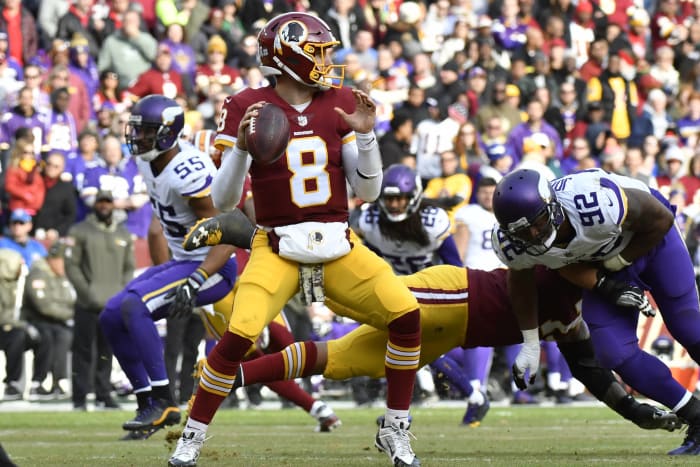
Maybe the ultimate winner in the franchise tag's 25-year history, Cousins balked at Washington's offers for years and cashed in for $44 million playing on back-to-back tags. Upon being the rare franchise quarterback on the market, the 30-year-old passer's now guaranteed $84M on a historic Vikings contract. Cousins broke out in 2016 and set multiple franchise records, upping his price after failed summer negotiations. Washington president Bruce Allen failed to sign his quarterback at the 2017 deadline and failed to pronounce his name correctly. Washington subsequently gave its franchise-QB money to 34-year-old Alex Smith.
2017-18: Le'Veon Bell

The Steelers are on the verge of seeing their historically talented skill-position duo of Bell and Antonio Brown break up. Pittsburgh in 2017 offered Bell a contract that paid him over $13 million annually — worth $30M in its first two years — but the All-Pro nixed the deal at the 11th hour. Bell's price floor is now his $14.5M franchise tender, putting Pittsburgh in a bind since no other running back earns more than $9M per year. If the parties can't reach a middle ground, the 26-year-old standout is likely bound for free agency in 2019. A third franchise tag would be worth an untenable $20M-plus.
Sam Robinson is a sportswriter from Kansas City, Missouri. He primarily covers the NFL for Yardbarker. Moving from wildly injury-prone sprinter in the aughts to reporter in the 2010s, Sam set up camp in three time zones covering everything from high school water polo to Division II national championship games
More must-reads:
- The Steelers should swallow their pride and pay Le'Veon Bell
- What would it look like if the NFL had no salary cap?
- The 'NFL 2025 Week 1 starting QBs' quiz
Breaking News
Trending News
Customize Your Newsletter
 +
+
Get the latest news and rumors, customized to your favorite sports and teams. Emailed daily. Always free!
PRIVACY POLICY EDITORIAL POLICY CONTACT US
ABOUT YARDBARKER TERMS OF SERVICE
Use of this website (including any and all parts and
components) constitutes your acceptance of these
Terms of Service and Privacy Policy.
This site is for entertainment purposes only.
There is no gambling offered on this site.
Gambling Problem? Call 1-800-Gambler.
